Jude Knight's Blog, page 76
October 13, 2019
Tea with Hopkins

Tristan Trent, the Marquess of Hopkins, hadn’t wanted to speak of matters that should remain private, but the rumors had reached the ears of Her Grace. If it were anyone else, he’d tell them to go hang, but this was the Duchess of Haverford, and perhaps she could help still the gossiping tongues come spring.
He pulled at his tight cravat. Nerves he hadn’t experienced since he was a lad entering Eton for the first time coursed through him as he followed the livered footman to the parlor where Her Grace awaited him.
“Hopkins, thank you for joining me,” Her Grace greeted, as a cup of the most delicate porcelain was presented to him.
“It is I who should thank you for the audience.”
Her Grace’s eyes twinkled. “You are wishing me to Hades, my dear. But you shall forgive me. I have heard the rumors, and I mean to help if I can. But first, I must know the truth for myself.”
“Yes, well, the truth.” He resisted the urge to pull at his cravat again as he settled across from the Duchess of Haverford.
“Is your wife truly back from the dead?”
It was the question everyone asked and wondered about. Everyone presumed Elaina dead, but Tristan never gave up hope, even when urged to do so and told to marry again and provide a mother for his small children. “She is,” he answered simply.
“How? Where was she? We all assumed….”
“It was a reasonable assumption.” He took a sip of the tea. “My wife, Elaina, washed up on the shores of Alderney, where she remained for three years.”
“I am informed that she didn’t recall who she was, or where she came from.”
“Yes, Your Grace,” he answered. “The only knowledge she possessed was her name because another sailor, who also was washed overboard, had heard it called out before the tragedy. He could only supply that she was on a merchant ship traveling from Saint-Malo, France to Plymouth.”
“Nothing else?”
“No. He’d not known of her presence before the storm struck and everyone had come up on deck to abandon the ship, which was soon to sink because of damage from the storm. For three years Elaina knew nothing else. When my brother, Harrison, visited Alderney and a man he hoped would be a business associate, and was introduced to her.”
“Did she remember your brother then?”
“No. Seeing his face, a man she’d known several years, stirred no memories.”
“Oh dear.”
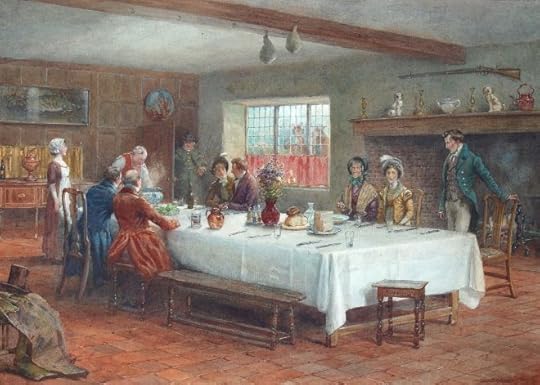
EXCERPT:
Elaina took a deep breath. Fear clutched at her heart, as she followed Harrison into the inn and remained silent when he inquired as to which chamber his brother could be found, and then followed him up the stairs until they stood before a dark wooden door and knocked.
A petite woman with blond hair answered the door. “Harrison!” she cried, clearly happy to see the man.
“So, this is where my family is,” he announced and stepped into the set of rooms. Elaina didn’t follow and tried to breathe through the anxiety crushing her chest. “It’s a good thing that I stopped at my home and discovered the various notes, or we would have traveled directly home and missed you completely.”
“We?” a voice questioned.
“Yes, we,” Harrison cleared his throat. “And I’m happy to be the one to facilitate this reunion.” At that, Harrison stepped aside and held out a hand to her. “I found Elaina.”
She allowed Harrison to pull her into the parlor and glanced around at the sea of shocked faces.
“Oh dear,” the blonde woman sighed.
“Elaina is it truly you?” a gentleman with dark hair set a glass aside and slowly crossed the room, staring at her as if he couldn’t believe that what he was seeing was real.
She had no response as she studied his appearance from the dark hair to the brown eyes, aquiline nose, firm lips and strong jaw, hoping for a sense of familiarity, but he was just as much a stranger as everyone else in the room.
“I can’t believe you’re back. I hoped, prayed…”
Before she knew what was happening, the stranger pulled her into an embrace. “Elaina, thank God you’ve come back to me.”
His voice was heavy with emotion and all she could surmise was this must be her husband.
He pulled back and looked down at her, and if she wasn’t mistaken, there was a light misting in his eyes as if he were near tears. Had he loved her so very much?
“Where were you? What happened? We thought you’d drowned.”
Elaina quickly glanced at Harrison and hoped for his assistance.
“Tristan, there is something you must know.”
His brow furrowed with concern. “I’m certain you’ll explain all of the details,” he dismissed and took Elaina’s hand, drawing her further into the room.
“Elaina doesn’t remember who she is.”
He stopped and turned. “What?”
“She washed ashore after the shipwreck and never recovered her memory of who she is, where she came from or why she was even on a ship,” Harrison explained.
Tristan’s eyes widened, and he studied her again. “Is it true? You don’t know me?”
At that, the tears threatened, but Elaina blinked them away. Harrison had told her that Tristan was her husband and Elaina had prayed that once she gazed upon his face that her memory would return. Except it hadn’t. Everything about her life before she woke in Alderney was gone, an empty canvas, and now she feared that it would never return.
The Forgotten Marquis
For three long and lonely years, Tristan Trent, the Marquess of Hopkins, waited for his wife Elaina’s return. Eyewitnesses insist no one could have survived the storm that swept her overboard, but Tristan refuses to give up hope—even when he is trapped into a betrothal he doesn’t want and forced to declare Elaina dead.
Elaina Trent has no memories of her life before waking in Alderney surrounded by strangers, and three years of trying to recall an elusive history has left her life in limbo. Determined to have a future even though her past is gone, she accepts a marriage proposal and a promise for a new life. But when a man claiming to be her brother-in-law stumbles across her, Elaina has no choice except to end her engagement and return to a husband she no longer knows.
When Elaina and Tristan are finally reunited, she still cannot recall what they once shared. Can she begin anew with a gentleman she doesn’t even know and hope that love grows once again, or will they remain strangers forever?
BUY LINKS:
Amazon: https://amzn.to/2knpTxS
iBooks: https://apple.co/2lqOceB
BN/Nook: http://bit.ly/2ls4V17
Meet Jane Charles
USA Today Bestselling Author Jane Charles lives in the Midwest with her former marine, police officer husband. As a child she would more likely be found outside with a baseball than a book in her hand, until one day, out of boredom on a long road trip, she borrowed her sister’s romance novel and fell in love. Her life is filled with three amazing children, two dogs, two cats, community theatre, and traveling whenever possible. Jane has authored romances set in the Regency era as well as Contemporary/New Adult.
JaneCharlesAuthor.com
Jane can be contacted at: janecharles522@gmail.com
Twitter: @JaneACharles
FB: https://www.facebook.com/JaneCharlesAuthor/







Physical book launches
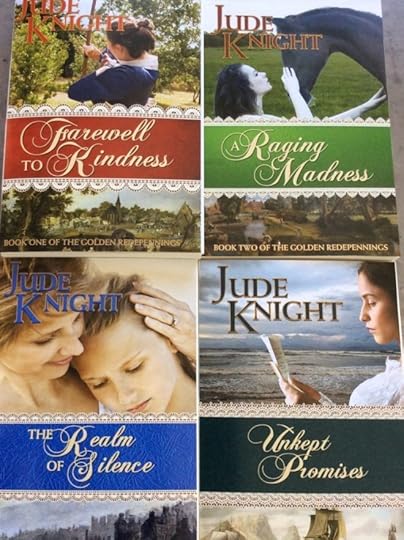
I’m just checking the page proofs for the print versions of the first 4 books in the Golden Redepenning series. I’m using a New Zealand printer for a physical book launch in the first book shop in New Zealand to carry my print books, Almo’s Books, in Carterton.
I’m organising long distance, since I didn’t get everything done before I received the three grandchildren I’m looking after while their mother has a much overdue and well-deserved holiday. I had them at my place last weekend, and now I’m at theirs for a week.
Aren’t the colours great? I wanted each of the books to be different, but clearly related. The spines need a bit of adjustment, but the printer emailed me the measurements, and I fixed them before I left Featherston.
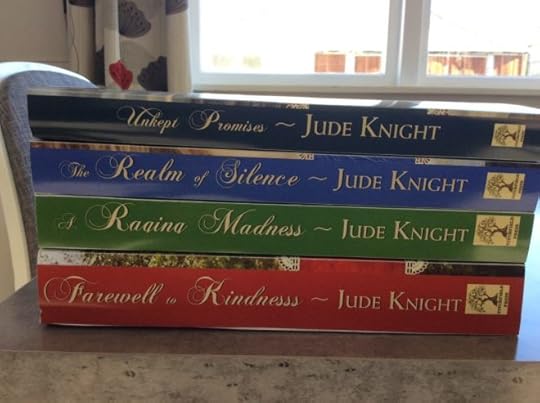
I could maybe have used reversed text for my author piece on Realm, but otherwise, I’m pretty happy.
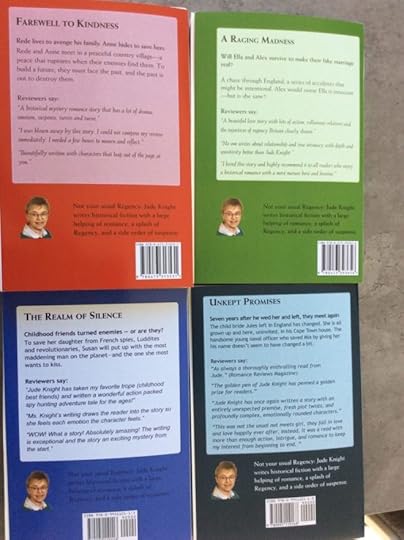
Now to check the contents.
Sometime in the next two days I need to print the posters I made before I left, and email them to the 5 local libraries and the various community centres with a request to put them up on noticeboards.
I’ve made a Facebook event, and I need to share it around. I’d like to get my invitations handed out on the train where I wrote at least half of each novel, but I’ll have to figure out how to do that long distance.
And then I need to update the sales one-pager for each book and send it to bookshops, and make sure that my updates at the National Library and Nielson Book Editor have taken effect.
And write a speech.
All this while prioritising the grandchildren and the day job. Sigh.
Meanwhile, I’m close to finishing The Gingerbread Caper, and the house is back on the market with a new agent — I still have the windows and oven to clean and one large garden to weed, but we’re at least ready for the photos, if not for the open homes.
Lists. I need lists
If you’re in the Wellington area on 24 September, please join me for a convivial evening at Almo’s Books. 6pm to 7.30 pm. I’d love to see you.
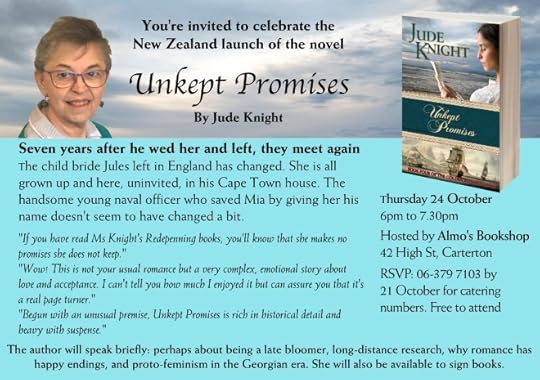







October 11, 2019
Photoshoot from CrowsEye Productions — Regency at Rise Hall
I’m loving the CrowsEye videos. CrowsEye Productions is a group of three women with a passion for history, art, and film-making. This one is from the Photoshoot series.







October 9, 2019
Comedy on WIP Wednesday

I love to read well-written comedy. Terry Pratchett is one of my favourite writers. In our favourite genre, Sally McKenzie is hilarious, Sophie Barnes can make me giggle, and Lorraine Heath is great at setting two unlikely people at one another’s heads for comedic effect. They’re just a few of the writers I enjoy. I’ve just read Amy Quinton’s latest Umbrella Chronicles story for next year’s Bluestocking Belles’ box set, and chuckled all the way through.
I’m not naturally a comedy writer, though I like to include wry humour in my books, and comedic moments. This week, I’m inviting you to post an excerpt in which you use humour. Mine is from my contemporary novella for Authors of Main Street, The Gingerbread Caper, which is as near as I’ve got to romantic comedy.
Patrick slept for the rest of the afternoon, waking disoriented in the unfamiliar room. He rolled onto his back and lay for a while, reorienting himself. He was in Valentine Bay, in a comfortable bed in a charming upstairs flat that looked out to the sea across the pohutaukawa trees that fringed the beach. He had nothing to do except relax and get well for at least the six weeks’ leave his doctor and manager had both ordered him to take. The time was — he turned his head to check the digital clock on the bedside table — just after six o’clock. The landlady was what he’d heard described as a pintsized Venus, who presence robbed him of sense, language, and—almost—breath.
The last circumstance very nearly cancelled out all the benefits of the accommodation and the location.
He sighed. He would need to grow accustomed, and he had better start by having a quick shower and getting downstairs for his dinner. With Meg Fotheringham.
He came out of the shower to find Mr. Major asleep on his bed, curled up on top of the clean underthings and t-shirt he’d left ready. Surely he had put the cat out before he lay down?
He’d told Meg he liked cats, which was something of an exaggeration. He had little experience of animals, having lived all his adult life in city apartments or boarding houses that didn’t allow them.
“How did you get in, cat?” The cat didn’t acknowledge him by so much as a twitch. Patrick made to tug the clothes out from beneath the beast and felt a sting as Mr. Major shot out a paw and sunk four sharp claws into his hand. One slitted eye glared at him, and the cat emitted a fierce yowl, half-way between a growl and a meow.
Patrick stifled his own yowl, and used one finger of the other hand to carefully detach the claws, whipping both hands out of reach just in time to miss an repeat engagement. Jumping backwards caused the towel he’d wrapped round him to slip, and he caught it before it dropped all the way to the floor. He wasn’t about to evict the cat without at least the semblance of some protection.
“Off my clothes, cat,” he menaced. Mr. Major tucked itself back into a curl, one paw over its nose. Both eyes remained open a slit to watch what Patrick meant to do next.
“Alright. But don’t say I didn’t warn you.” Patrick stripped back the blanket that covered the bed, tipping cat and clothes onto the floor. The cat swore at him—tone and glare quite unmistakeable—and shot under the bed.
Patrick retrieved his clothes. At least they weren’t covered in cat hair. He picked a few errant hairs off the dark background of the t-shirt and dressed, ignoring the feline under the bed.
Ready to go downstairs, he took a quick look around the place, searching for an opening that might have allowed the cat in, and that would let it out again. The window in the bathroom was over a sheer drop. Two other windows had catches that allowed only an inch or so of opening.
He addressed the cat. “How did you do it?” Twenty past six. He’d better hurry. He stooped, and met the cat’s amber eyes. It was up against the wall at the head of the bed—too far to reach even if he’d been prepared to have his hands shredded.
“If you misbehave while I’m out, I’ll make a hat out of you,” he threatened.
When he opened the door, the cat shot out, almost tripping him over at the top of the stairs. He caught himself, and followed the fiend downstairs.







October 6, 2019
Tea with the Society

In the following passage from the novella Melting Matilda, my heroine (a ward of the Duchess of Haverford) is attending a meeting of a society formed to offer succour to war veterans and their families. Their patroness is, of course, The Duchess herself. Click on the title to read more about the novella, and the Fire & Frost page on the Bluestocking Belles’ website to read about the other five stories, all of which involve The Ladies’ Society for the Care of the Widows and Orphans of Fallen Heroes and the Children of Wounded Veterans and the events they organise during a cold January and February in 1814.
Matilda and her sister Jessica entered one of the less formal parlors, where the duchess waited for them, her current companion at her side, and Cedrica Fournier, her previous companion, already seated before a table, pen and paper ready to take notes.
Madame Fournier had left her position to marry, but she had volunteered to be secretary for this committee. Jessica and Matilda took turns in greeting her with a kiss in the vicinity of her cheek, and as they did, the other ladies began to arrive.
The first part of the meeting was given over to reports. The work of the Society was organized by small groups, sometimes as few as two or three ladies. Lady Felicity Belvoir, through her connections to half the families of the ton, kept them aware of social events at which they could canvas for votes in Parliament. Lady Georgiana Hayden was in charge of writing pamphlets to sway opinion, and Lady Constance Whittles marshalled a miniature army of letter writers for the same purpose.
Many of the Society’s members also volunteered at hospitals where injured veterans were nursed and orphanages that cared for veterans’ children. They visited widows where they lived, some in very insalubrious areas. The duchess agreed with the necessity: how else were they to meet real needs if they did not first talk to those who were suffering? She insisted on the volunteers and visitors travelling in groups and being escorted by stout footmen.
Once all the groups had reported back, they discussed their next fundraising event. The ladies offered one idea after another. The duchess would hold a charity ball, of course, as she did every year, but none of them felt that would be enough to really draw attention to the cause. Something special was called for. Something unusual.
Matilda was not sure who suggested a Venetian Breakfast, but the star suggestion of the day came from a shy girl who was new to the Society. Miss Fairley rose to her feet and waited for Mrs. Berrisford, the meeting’s chair, to notice her.
“I wondered if we might hold a picnic basket auction,” she said, flushing pink at being the center of attention. We have done them at home as fundraisers for the church, and they are very popular.”
Two of the ladies objected that midwinter was hardly time for a picnic, but Mrs. Berrisford called for silence. “Go on, Miss Fairley,” she encouraged. “How does it work?”
“The ladies provide a basket of food,” Miss Fairley explained, “and the gentlemen bid for the right to share the basket with the provider. It is usually the single ladies, of course.” Her voice faded almost to nothing as her blush deepened to scarlet.
Mrs. Berrisford called for order again, as the Society’s members all tried to express an opinion at once.
The duchess rose, and those who had not already stopped talking fell silent to see what she thought. “If we can ensure propriety, ladies, such an auction would be just the thing to bring in donations from the younger gentlemen, who are far more likely to spend their funds on less helpful activities.”
That settled it, of course. Discussion turned to ways and means, and before the meeting was over, several more groups had been established, to cover the various aspects of three events: Venetian Breakfast, auction, and ball, all on the same day.
“Could the auction prize include a dance at the ball later?” Jessica made the suggestion. “That way, gentlemen who have bought a basket will also be obliged to buy a ball ticket.”
The suggestion was met with a hum of approval.
“We will need to enlist the ladies of the ton,” Mrs Berrisford said. “I suggest each of us talks to as many as possible; older ladies to the mothers, younger to the girls. The men, too, of course; but ladies first.”
“We can start at Lady Parkinson’s in two days’ time,” one of the other ladies proposed.
That seemed to be the end of the decision making, though many of the members lingered for another cup of tea and one of the delicious little cakes Monsieur Fournier supplied to the duchess for her meetings.
Matilda and Jessica, in their role as daughters of the house, moved from group to excited group, knowing Her Grace would wish to know what was being said in these more casual conversations.
Everyone was excited by the plans, and more than one person was hoping that the fog would lift so that Lady Parkinson’s soiree would proceed and they could begin their campaign.







Spotlight on Fire & Frost
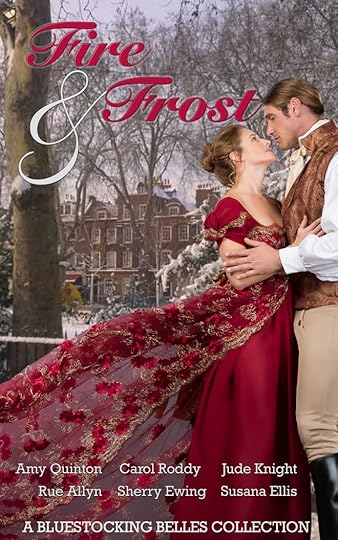
I’m thrilled to be able to tell you about the Belles’ next box set, Fire & Frost. We revealed the cover yesterday, and within a week the final versions of our stories are due to the editors. It is released on 4 February 2020, but the gestation of a box set is a long process. We started in February this year. My story is called Melting Matilda and it’s a novella associated with the Children of the Mountain King series.
 Fire & Frost
Fire & Frost
Join the The Ladies’ Society For The Care of the Widows and Orphans of Fallen Heroes and the Children of Wounded Veterans in their pursuit of justice, charity, and soul searing romance.
The Napoleonic Wars have left England with wounded warriors, fatherless children, unemployed veterans, and hungry families. The ladies of London, led by the indomitable Duchess of Haverford plot a campaign to feed the hungry, care for the fallen—and bring the neglectful Parliament to heel. They will use any means at their disposal to convince the gentlemen of their choice to assist.
Their campaign involves strategy, persuasion, and a wee bit of fun. Pamphlets are all well and good, but auctioning a lady’s company along with her basket of delicious treats is bound to get more attention. Their efforts fall amid weeks of fog and weather so cold the Thames freezes over and a festive Frost Fair breaks out right on the river. The ladies take to the ice. What could be better for their purposes than a little Fire and Frost?

Her scandalous birth prevents Matilda Grenford from being fully acceptable to Society, even though she has been a ward of the Duchess of Haverford since she was a few weeks old. Her half-brother, the Marquis of Aldridge, is convinced she will one day be wooed by a worthy gentleman, but Matilda has no such expectations. The only man who has ever interested her gave her an outrageous kiss a year ago and has avoided her ever since.
Charles, the Earl of Hamner is honour bound to ignore his attraction to Matilda Grenford. She is an innocent and a lady, and in every way worthy of his respect—but she is base-born. His ancestors would rise screaming from their graves if he made her his countess.
When his mother and her guardian begin collaborating on Her Grace’s annual charity fundraiser, neither Charles nor Matilda sees a way to avoid working together. And neither can forget the kiss they once shared.

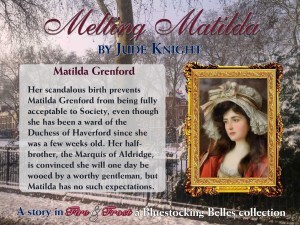







October 4, 2019
Dancing the quadrille
Quadrille anyone? You’d really have to know what you were doing, or you’d throw everyone off! A muttered ‘Follow my lead’ just isn’t going to do it.







October 2, 2019
Introductions in WIP Wednesday
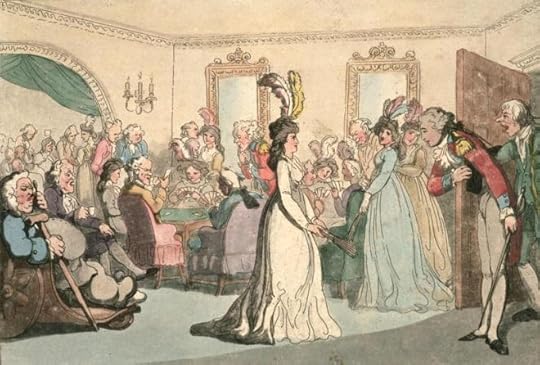
We want to meet the main characters in the story early on. We want to know a bit about them, and we want to get a sense of whether they’re likeable (the protagonists) or potentially villainous. But we don’t want to be overwhelmed with backstory. Today, I’m asking you to share a few paragraphs from when one of your main characters appears in your story. Mine is my heroine from The Darkness Within, one of my current projects.
Serenity Witness would be Chosen in the next ballot. This was not a matter of faith, it was an inevitable fact, since she was the last of the current crop of brides. Hers would be the only lot in the golden chalice that was used at the ceremony. Even though the girls two years younger had been moved into the bride house after the Winter Solstice, it was only so that the Spring and Summer brides would not be alone, and the Spring bride had been Chosen just over two months ago. Her turn would end four weeks and a day from now.
The younger girls were all tremendously excited about the ballot ceremony tomorrow, but mostly because, in three months, their lots would be added to the chalice, and one of them would be chosen as Autumn bride. They assumed Serenity was even more enthusiastic, and she did nothing to dissuade them.
She should be delighted, of course. She was way past the age when most Witness girls entered adulthood.
The Powers had passed her by the first year she was eligible, when she was just sixteen. Seven females shared her birth year, and three were still unchosen from the year before. In the second year, she was left again. In the third year, the four girls a year younger were added, and that year, Serenity was Chosen, but between the ballot and the wedding, she contracted smallpox and nearly died.
By the time she recovered, another had taken her place, for the vitality of the community depended on the Chosen bride, and the position could not be left vacant.
Her smallpox scars did not matter, the Incarnate One assured her. The Powers saw beyond the surface, to the beautiful soul within. Still, they passed her by in the next ballot, and the next, until here she was, nearly twenty years of age and still a maiden bride.
Sitting in the little chapel of the bride house, she faced the Powers and confessed what they, who knew all, must already see within her. “I am afraid.”
At sixteen, she would have been thrilled. Even at eighteen months ago, had she not contracted the smallpox, she would have been nervous about being the centre of attention, concerned about failing in her duties, but deeply content to step over the threshold that marked the separation between girl and woman.
“I am afraid,” she repeated. “I doubt, even though I know that I should not. Take away my doubt, dear Powers.” Every one said that to be Chosen was the greatest of all privileges, and that the three months the Chosen spent as Goddess Incarnate filled her with a joy that would last the remainder of her life. But ever since her friend Verity was tempted from the path by the acolyte called Paul, Serenity had been unable to keep the questions from her mind.
Paul had moved on a few days before Verity became Goddess Incarnate and Verity had served her appointed term, but Serenity had seen the sadness in her eyes when she stepped down from beside the One after the Goddess moved to the next Chosen. A few weeks after she entered the wives’ house, she had died suddenly—an accident with a knife, the community was told. But Serenity had doubted, and the doubts multiplied as she began to notice other signs of secret distress amongst the wives.
“Take away my doubts,” she prayed, but the calm certainty she sought evaded her.







September 29, 2019
If we only had time
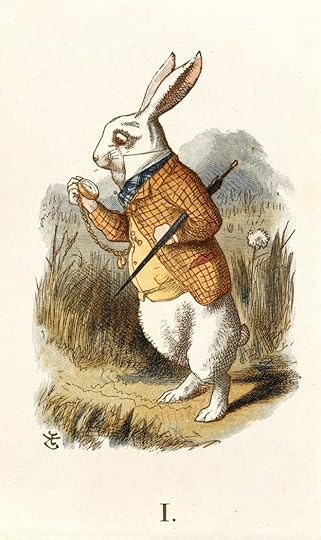
Daylight saving started in New Zealand in the early hours of Sunday morning, which led to a conversation in the work kitchen this morning about time.
Time is a construct, said the engineer among us, given importance by trains. He then whisked out of the room with his coffee, leaving the rest of us to discuss the concept.
He is, of course, quite correct. Once, everywhere in the known world took its time from the sun (translated into candle time or water time, but the reference point was the sun, as translated through some form of sun dial).
In fact, that’s still true today, since all the timekeeping in the English-speaking world relates back to Greenwich Mean Time, which is calculated from solar time — in fact, average solar midnight at Greenwich. (There’s a whole lot more history, but that’s enough for now.)
The thing is, up until the invention of railways, solar time was good enough. Even though clock technology improved, a clock was only as accurate as its reference point. Every village, every ship at sea, every point East to West across the map, calculated its own solar time. You could travel from the East of Kent to the West of Ireland, and have to put your watch back an hour.
Since the whole trip would take a couple of weeks, what did it matter? A few minutes between overnight stops made very little difference.
Then came the railways.
All of a sudden, exact times mattered. Not only were people travelling at four times the speed — and for longer each day; those controlling the railways needed to know when trains were going to be where, and know it precisely. It was a matter of life or death.
Here’s a fascinating map that shows how far out from solar time various parts of each time zone are. https://www.dailymail.co.uk/sciencetech/article-2572317/Are-YOU-living-sync-Amazing-map-reveals-manmade-timezones-countries-false-sense-sun-rises.html
You’ll see that in China, where all clocks are set to Beijing time, solar noon takes place at 3pm in the far west of the country.
On a related point, we think of a moment as a very brief fraction of time. This reflects our business, perhaps, because — for our ancestors — a moment was longer than a minute. How long? It depends. The word comes from a Latin root meaning movement, and the movement in question was that of a shadow on a sundial. A moment was the time it took the shadow to move between the two smallest marks. With 40 marks to an hour, at the equinoxes, a moment was 90 seconds in our time. A moment was longer in the summer, and shorter in the winter — something to tell your kids when you ask them to wait just a moment.







September 27, 2019
Religions and revival in Georgian England
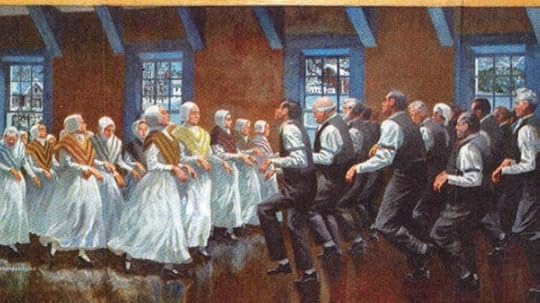
Shakers worshipped in dance
I’ve been reading up about dissenters, pantheists, cults, and other non-traditional religionists in the 18th and early 19th century. In religion, as in society as a whole, it was a time of ferment. New ideas and new ways of doing things led to (and came out of) the industrial revolution, the French and American revolutions, revolutions in the approaches to scientific inquiry, artistic expression, fashion, farming, architecture, and all kinds of other aspects of human society. How people worshipped was part of, and in part fuelled, that change.
Some writers make the direct link. It was those driven from France into the Lowlands after the Edict of Nantes (Lutherans, Catholics, Jews, and members of other persecuted sects) that, thrown together in exile, began to question conventional social mores.
Their heretical opinions about orthodox Christianity led some of them into the extremes of Puritanism, and others to deny all labels. ” I am not Lutheran, Calvinist, Arminian, Socinian, Anabaptist, or Quaker,” says book factor, Prosper Marchand, one of the voices in that place and time. He avowed a Christianity with no organised church and no official doctrine, and this in 1712. From such radical thinking, itself fuelled by Renaissance humanism, came the Enlightenment, as well as Hellfire clubs, messianic cults, poetic pantheism, and the Great Awakening, with its new forms of established religion such as Methodism. These, in time, led to the reform of those institutions that had triggered the change.
Millenialism was a strong strain in the American Revolution. Victory over the British showed that God favoured America, and those with millenialist leanings became convinced that it was in the United States that Christ would reign for 1000 years. Even the French revolution had religious roots, with the diaspora mentioned above strongly shaping the politics of the revolutionaries. Some argue that the industrial revolution, likewise, was a consequence of religious thinking.
Religions influenced by dualistic philosophies view the material world with suspicion and hostility. The material world is considered evil, while the spiritual world is considered good and noble. Renouncing this world became the mark of holiness. Equally detrimental to the development of science were world views that did not have a concept of a supreme personal Creator God. Some of the ancient civilizations, for example, which did develop some mathematics and technologies, did not develop general scientific theories, because of the absence of a creationist perspective that gives confidence in the existence of rational laws in nature. This clearly explains the lack of interest on the part of these cultures in scientific research and technology. It also shows how the Reformation, with its return to Biblical Christianity, spurred a phenomenal interest in fundamental research and technology. The great scientific advances and the industrial revolution that followed bear this out. (Institute for Christian Research)
The abolition of slavery, wide-spread education, broadening of the suffrage, workers rights — all of these 19th century innovations were championed by those who inherited the Great Awakening; that is, by the intellectual and spiritual children of those religious exiles.
In my book The Darkness Within, my hero’s investigation into a disappearance leads him into a pantheist cult.










